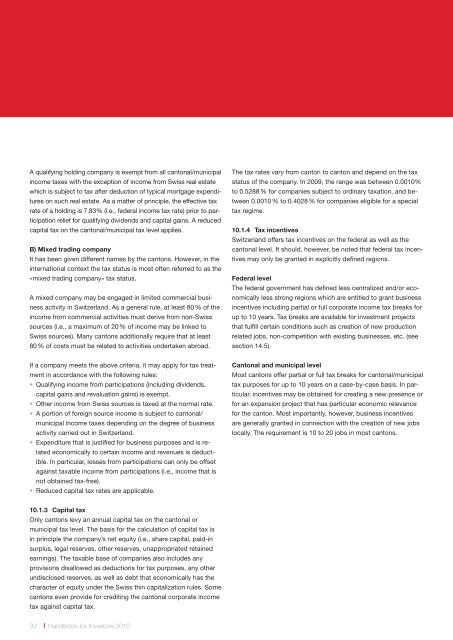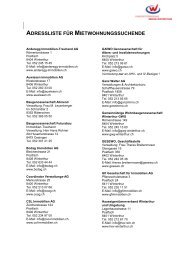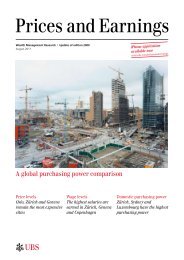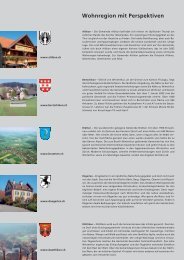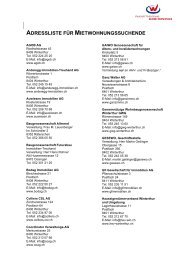Handbook for Investors. Business location in Switzerland.
Handbook for Investors. Business location in Switzerland.
Handbook for Investors. Business location in Switzerland.
You also want an ePaper? Increase the reach of your titles
YUMPU automatically turns print PDFs into web optimized ePapers that Google loves.
A qualify<strong>in</strong>g hold<strong>in</strong>g company is exempt from all cantonal/municipal<br />
<strong>in</strong>come taxes with the exception of <strong>in</strong>come from Swiss real estate<br />
which is subject to tax after deduction of typical mortgage expenditures<br />
on such real estate. As a matter of pr<strong>in</strong>ciple, the effective tax<br />
rate of a hold<strong>in</strong>g is 7.83% (i.e., federal <strong>in</strong>come tax rate) prior to participation<br />
relief <strong>for</strong> qualify<strong>in</strong>g dividends and capital ga<strong>in</strong>s. A reduced<br />
capital tax on the cantonal/municipal tax level applies.<br />
B) Mixed trad<strong>in</strong>g company<br />
It has been given different names by the cantons. However, <strong>in</strong> the<br />
<strong>in</strong>ternational context the tax status is most often referred to as the<br />
«mixed trad<strong>in</strong>g company» tax status.<br />
A mixed company may be engaged <strong>in</strong> limited commercial bus<strong>in</strong>ess<br />
activity <strong>in</strong> <strong>Switzerland</strong>. As a general rule, at least 80 % of the<br />
<strong>in</strong>come from commercial activities must derive from non-Swiss<br />
sources (i.e., a maximum of 20 % of <strong>in</strong>come may be l<strong>in</strong>ked to<br />
Swiss sources). Many cantons additionally require that at least<br />
80 % of costs must be related to activities undertaken abroad.<br />
The tax rates vary from canton to canton and depend on the tax<br />
status of the company. In 2009, the range was between 0.0010%<br />
to 0.5288 % <strong>for</strong> companies subject to ord<strong>in</strong>ary taxation, and between<br />
0.0010 % to 0.4028 % <strong>for</strong> companies eligible <strong>for</strong> a special<br />
tax regime.<br />
10.1.4 Tax <strong>in</strong>centives<br />
<strong>Switzerland</strong> offers tax <strong>in</strong>centives on the federal as well as the<br />
cantonal level. It should, however, be noted that federal tax <strong>in</strong>centives<br />
may only be granted <strong>in</strong> explicitly def<strong>in</strong>ed regions.<br />
Federal level<br />
The federal government has def<strong>in</strong>ed less centralized and/or economically<br />
less strong regions which are entitled to grant bus<strong>in</strong>ess<br />
<strong>in</strong>centives <strong>in</strong>clud<strong>in</strong>g partial or full corporate <strong>in</strong>come tax breaks <strong>for</strong><br />
up to 10 years. Tax breaks are available <strong>for</strong> <strong>in</strong>vestment projects<br />
that fulfill certa<strong>in</strong> conditions such as creation of new production<br />
related jobs, non-competition with exist<strong>in</strong>g bus<strong>in</strong>esses, etc. (see<br />
section 14.5).<br />
If a company meets the above criteria, it may apply <strong>for</strong> tax treatment<br />
<strong>in</strong> accordance with the follow<strong>in</strong>g rules:<br />
• Qualify<strong>in</strong>g <strong>in</strong>come from participations (<strong>in</strong>clud<strong>in</strong>g dividends,<br />
capital ga<strong>in</strong>s and revaluation ga<strong>in</strong>s) is exempt.<br />
• Other <strong>in</strong>come from Swiss sources is taxed at the normal rate.<br />
• A portion of <strong>for</strong>eign source <strong>in</strong>come is subject to cantonal/<br />
municipal <strong>in</strong>come taxes depend<strong>in</strong>g on the degree of bus<strong>in</strong>ess<br />
activity carried out <strong>in</strong> <strong>Switzerland</strong>.<br />
• Expenditure that is justified <strong>for</strong> bus<strong>in</strong>ess purposes and is related<br />
economically to certa<strong>in</strong> <strong>in</strong>come and revenues is deductible.<br />
In particular, losses from participations can only be offset<br />
aga<strong>in</strong>st taxable <strong>in</strong>come from participations (i.e., <strong>in</strong>come that is<br />
not obta<strong>in</strong>ed tax-free).<br />
• Reduced capital tax rates are applicable.<br />
Cantonal and municipal level<br />
Most cantons offer partial or full tax breaks <strong>for</strong> cantonal/municipal<br />
tax purposes <strong>for</strong> up to 10 years on a case-by-case basis. In particular,<br />
<strong>in</strong>centives may be obta<strong>in</strong>ed <strong>for</strong> creat<strong>in</strong>g a new presence or<br />
<strong>for</strong> an expansion project that has particular economic relevance<br />
<strong>for</strong> the canton. Most importantly, however, bus<strong>in</strong>ess <strong>in</strong>centives<br />
are generally granted <strong>in</strong> connection with the creation of new jobs<br />
locally. The requirement is 10 to 20 jobs <strong>in</strong> most cantons.<br />
10.1.3 Capital tax<br />
Only cantons levy an annual capital tax on the cantonal or<br />
municipal tax level. The basis <strong>for</strong> the calculation of capital tax is<br />
<strong>in</strong> pr<strong>in</strong>ciple the company’s net equity (i.e., share capital, paid-<strong>in</strong><br />
surplus, legal reserves, other reserves, unappropriated reta<strong>in</strong>ed<br />
earn<strong>in</strong>gs). The taxable base of companies also <strong>in</strong>cludes any<br />
provisions disallowed as deductions <strong>for</strong> tax purposes, any other<br />
undisclosed reserves, as well as debt that economically has the<br />
character of equity under the Swiss th<strong>in</strong> capitalization rules. Some<br />
cantons even provide <strong>for</strong> credit<strong>in</strong>g the cantonal corporate <strong>in</strong>come<br />
tax aga<strong>in</strong>st capital tax.<br />
92 <strong>Handbook</strong> <strong>for</strong> <strong>Investors</strong> 2010


